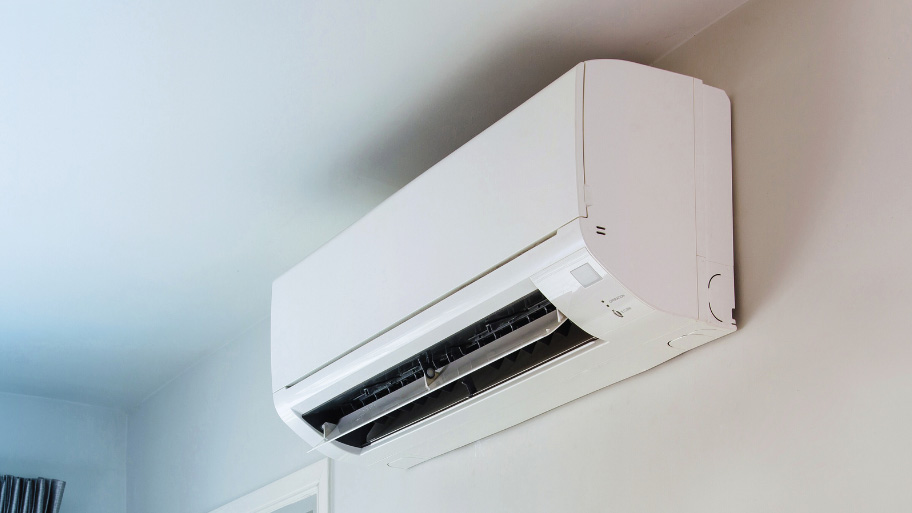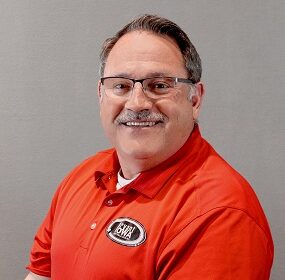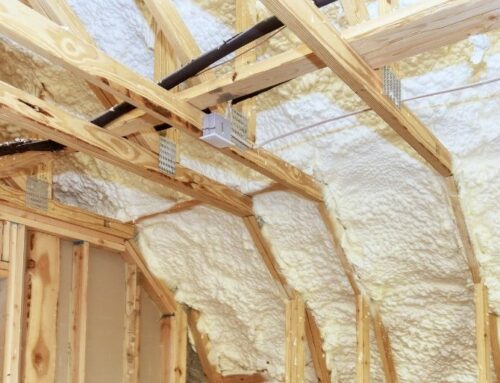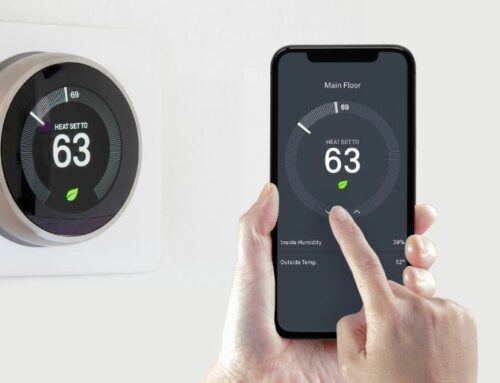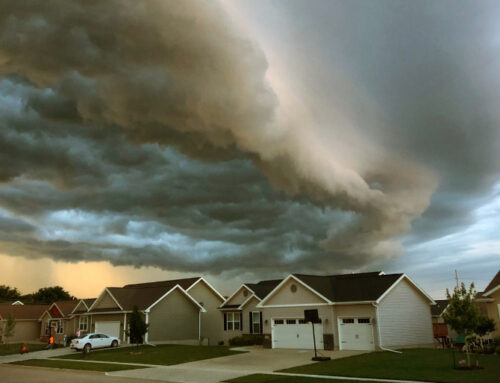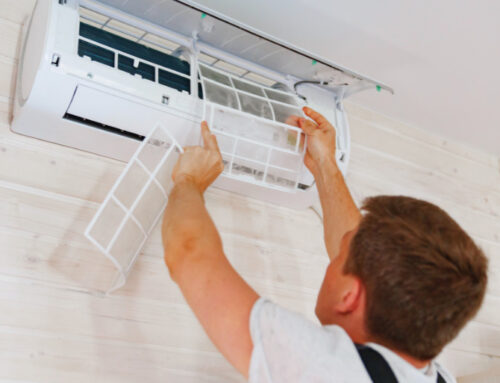In Iowa’s scorching summer months, air conditioning is a must-have. It not only ensures comfort but also boosts productivity and overall health. This Air Conditioning 101 guide will help you learn how to properly maintain and optimize your air conditioning system to enhance its efficiency and lower your energy bills, keeping you cool all summer.
We’ll explore how air conditioners works, the different types available, and essential tips for keeping your home cool. We’ll also cover how to choose the right air conditioner for your home, the importance of yearly maintenance, and how to work with an HVAC contractor.
How Does an Air Conditioner Work
Air conditioners are vital in combating the heat, but understanding their operation can help in maintaining and optimizing them. In this section, we’ll cover the air conditioning basics to give you a solid foundation.
1. The Basics of Air Conditioning
Air conditioners function by extracting heat from the inside of your home and transferring it outside. This process relies on several crucial components:
Refrigerants: These substances absorb heat from indoor air and carry it outside.
Compressors: These devices pressurize the refrigerant, facilitating its movement through the system.
Condensers: Placed outdoors, these units release the heat collected from inside the home.
Together, these elements work to cool the indoor air and maintain a pleasant indoor temperature. Essentially, the system:
Circulates it back into your home.
2. What are Refrigerants?
Refrigerants are special fluids used in air conditioners to absorb and release heat. They:
Cycle through the system.
Change from a gas to a liquid and back.
Effectively remove heat from your home.
Common types of refrigerants include:
R-22: Older, less environmentally friendly.
R-410A: Newer, more efficient and eco-friendly.
3. Where Does an Air Conditioner Pull Air From?
An air conditioner pulls warm air from inside your home through return air ducts. This air:
Passes over the evaporator coils.
Transfers heat to the refrigerant.
Cools down before circulating back into your living spaces.
4. What Part of the Air Conditioning Unit Helps to Clean the Air?
The air filter is a crucial part of the air conditioning system that helps to clean the air. It:
Traps dust, pollen, and other airborne particles.
Improves indoor air quality.
Needs regular replacement or cleaning for efficient operation.
Types of Air Conditioners
Choosing the right type of air conditioner for your home can significantly impact comfort and efficiency. Let’s explore the main types of air conditioners and their benefits.
1. Central Air Conditioner
Central air conditioners are designed to provide cooling throughout an entire home, utilizing a network of ducts to distribute cool air to various rooms.
How It Works: These systems comprise an outdoor unit that connects to an indoor coil. The refrigerant flows through these components, drawing heat from the indoor air and releasing it outside. The chilled air is then delivered through the ducts to cool the home.
Efficiency: Central air conditioning systems are known for their high energy efficiency, which is further enhanced when paired with programmable thermostats to better manage energy consumption.
Why Choose a Central Air Conditioning System
Consistent Temperature: Central air conditioners maintain a uniform temperature throughout your home.
Quieter Operation: Because the main unit is outside, indoor noise levels are lower.
Increased Home Value: Central air systems are a desirable feature for potential homebuyers.
2. Ductless Air Conditioner
Ductless systems, often referred to as mini-splits, are ideal for residences without existing ductwork.
Operation: These systems have an external unit connected to indoor units, usually mounted on walls. Heat is transferred via refrigerant lines, cooling the indoor air effectively.
Advantages: These systems offer the ability to set different temperatures in various rooms, providing customized comfort and enhancing energy efficiency.
Why Choose a Ductless Air Conditioning System
Easy Installation: No need for extensive ductwork, which makes installation quicker and less invasive.
Energy Efficiency: By cooling only specific areas, ductless systems can reduce energy consumption.
Zone Control: Ability to set different temperatures in different rooms, enhancing comfort.
3. Heat Pumps
Heat pumps are versatile systems capable of providing both heating and cooling, making them a practical year-round solution.
Functionality: These systems work by moving heat instead of producing it. In warm weather, they extract heat from your home and release it outside. During colder months, the process is reversed to bring warmth into your home.
Flexibility: Suitable for a range of climates, heat pumps perform efficiently in both moderate and extreme temperatures.
Why Choose a Heat Pump System
Dual Functionality: Provides both heating and cooling, eliminating the need for separate systems.
Energy Savings: Heat pumps are often more energy-efficient than traditional heating and cooling systems.
Environmental Benefits: By using electricity rather than fossil fuels, heat pumps can reduce your home’s carbon footprint.
Air Conditioning Tips for Iowa Summers
Choosing the right HVAC system is crucial for energy efficiency and cost savings. Let’s explore how traditional and green HVAC systems differ in energy consumption and overall performance.
1. Regular Maintenance
Choosing the right HVAC system is crucial for energy efficiency and cost savings. Let’s explore how traditional and green HVAC systems differ in energy consumption and overall performance.
Changing Filters: Replace air filters every 1-2 months to ensure proper airflow and reduce strain on the system.
Cleaning Coils: Dust and debris can accumulate on the coils, reducing efficiency. Clean them annually to maintain optimal performance.
Professional Inspections: Schedule a professional check-up at least once a year to identify and fix potential issues before they become major problems.
2. Insulating Walls and Installing Blinds/Shades
Proper insulation and window treatments can significantly improve your home’s energy efficiency.
Insulation: Ensure that your walls and attic are well-insulated to keep cool air inside and hot air outside. This reduces the workload on your air conditioner.
Blinds and Shades: Use blinds or shades on windows to block out direct sunlight. This simple step can prevent rooms from overheating and help maintain a cooler indoor temperature.
3. Placing the Air Conditioner in a Shaded Area
The location of your outdoor air conditioning unit can impact its efficiency.
Shade: Position your outdoor unit in a shaded area to prevent it from overheating and reduce energy consumption. However, ensure there is enough space around it for proper airflow and maintenance access.
4. Using Plants and Landscaping for Protection
Strategic landscaping can offer natural protection and enhance your air conditioner’s efficiency.
Plants: Planting trees or shrubs around your home can provide shade and reduce the amount of heat absorbed by the building. Ensure they are placed at a distance that allows proper airflow to the outdoor unit.
Landscaping: Create a cool microclimate around your home with well-placed greenery. This not only cools the air but also adds aesthetic value to your property.
5. Complementing the Air Conditioner with Fans
Using fans in conjunction with your air conditioner can improve air circulation and cooling.
Ceiling Fans: Ceiling fans help distribute cool air more evenly throughout the room. Set them to rotate counterclockwise during the summer to push cool air down.
Portable Fans: Use portable fans to direct air where it’s needed most, reducing the overall demand on your air conditioner and saving energy.
How to Choose an Air Conditioner for Your Home
When selecting an air conditioner for your Iowa home, it’s important to consider the local climate and your home’s specific needs.
Home Size and Type: For larger homes, central air systems are effective at cooling multiple areas through a network of ducts. On the other hand, ductless mini-split systems are suitable for smaller homes or those without existing ductwork, providing flexibility and efficient cooling.
Energy Efficiency: When choosing an air conditioner, examine the SEER (Seasonal Energy Efficiency Ratio) rating. Higher SEER values indicate more efficient operation, which can result in lower energy costs and less environmental impact. Opt for Energy Star-certified models to ensure top-notch efficiency and savings.
The Importance of Yearly Maintenance
Ensuring your air conditioning system undergoes regular maintenance is essential for its durability and optimal performance. Annual inspections can prevent unexpected failures and ensure your system operates efficiently throughout the year.
Benefits of Regular Maintenance
Routine maintenance offers several important advantages:
Enhanced Efficiency: Consistent cleaning and fine-tuning keep your system operating efficiently, which helps reduce energy usage and lowers your electricity bills.
Longer Lifespan: Regular inspections can catch minor problems early, preventing them from turning into major issues and thus extending the life of your system.
Improved Air Quality: Replacing or cleaning filters and checking for mold or debris ensures that the air in your home remains clean and healthy.
Reduced Breakdowns: Preventive maintenance decreases the chances of unexpected failures, ensuring your system is reliable during the hottest months.
What to Expect During an HVAC Maintenance Visit
During a maintenance check, a professional technician will perform the following tasks:
Component Inspection and Cleaning: The technician will thoroughly examine all parts of the system, clean the coils, and check the refrigerant levels.
Filter Examination: Filters will be inspected and replaced if needed to ensure proper airflow and maintain air quality.
System Testing: All controls and thermostats will be tested to verify they are working correctly.
Issue Identification: The technician will identify and address any potential problems to prevent them from becoming major issues.
Working with an HVAC Contractor
Partnering with a dependable HVAC contractor is crucial for the correct installation and upkeep of your air conditioning system. Here’s how to find the right professional and what you can anticipate during the process.
Finding a Reliable Contractor in Iowa
Here’s how to select a dependable HVAC contractor in Ankeny, IA and the surrounding areas:
Seek Referrals: Start by asking friends and family for their recommendations. Also, review online feedback to gauge the contractor’s reputation.
Check Qualifications: Ensure the contractor has the necessary licenses, insurance, and professional certifications. This confirms their adherence to industry standards.
Assess Experience: Opt for a contractor who has significant experience with HVAC systems like yours. Experienced contractors can better diagnose and resolve issues.
Evaluate Communication: Observe the contractor’s communication style. Reliable contractors are responsive, clear, and willing to address your questions.
Choosing a reliable HVAC contractor guarantees your air conditioning system will work efficiently and effectively, keeping your home cool during Iowa’s hot summers.
Professional maintenance can help prevent unexpected failures, lower energy costs, and extend the system’s life. Don’t wait for a breakdown—contact Bryant Iowa today to schedule a consultation and ensure your HVAC system is ready for the summer heat in Ankeny, IA and the surrounding areas.
